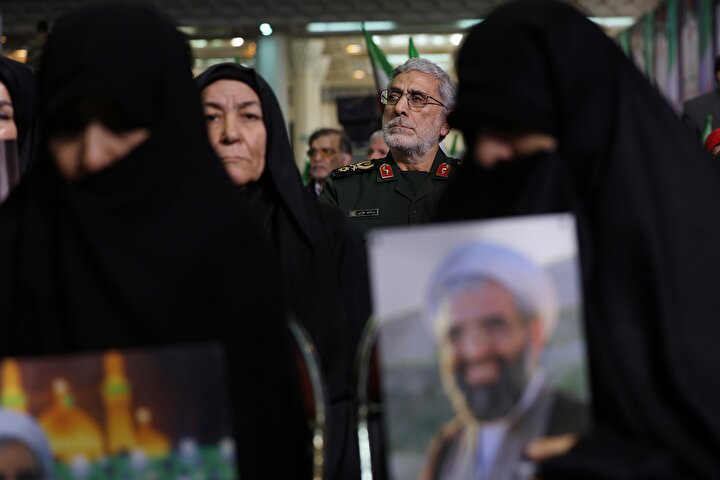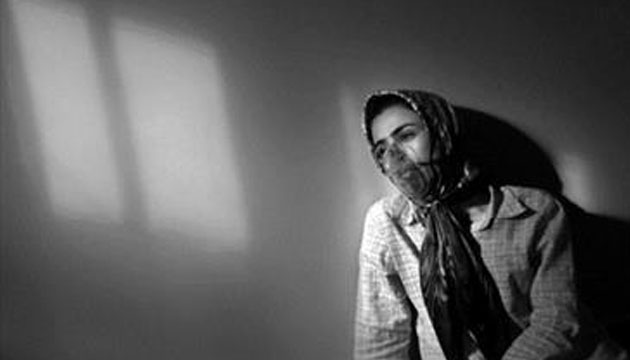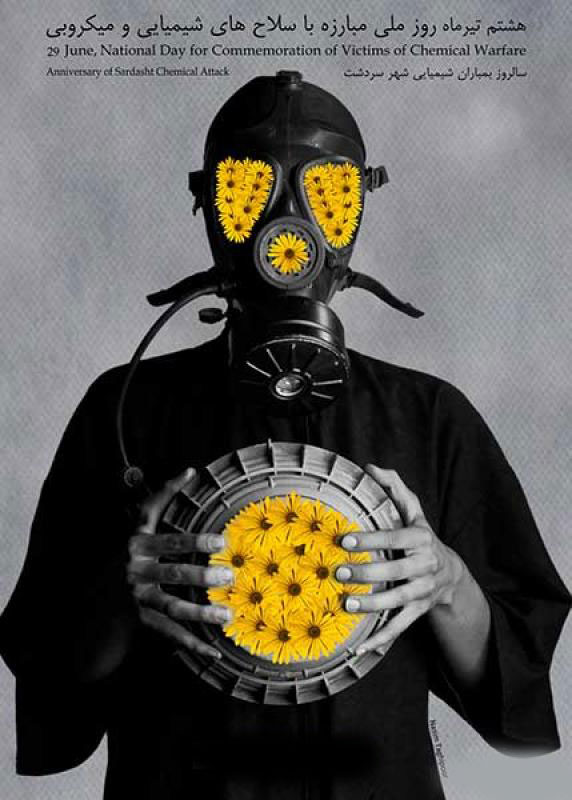
The Poisoned Breaths of Colonialism

By the report of Navideshahed, For the first time during the history, the Iraqi Baathist regime deployed chemical weapons against the Iranian civil areas and Iraqi Kurdistan region which was lead to martyrdom and injury of thousands of innocent people who did not have any protective equipment. The climax of this crime was the chemical bombardment which took place against Sardasht city on June 28, 1987 which martyred and injured more than 4500 persons.
It can be strongly stated that chemical warfare are the only warfare which have the highest and oldest international treaties for its prohibition. Due to its inhuman and wild nature, these weapons would be used in the battlefields in the most initial and basic forms and different treaties and resolutions have been made in this field as well. The first international agreement limiting the use of chemical weapons dates back to 1675, when France and Germany came to an agreement, signed in Strasbourg, prohibiting the use of poison bullets.
Almost exactly 200 years later, in 1874, the next treaty or agreement of this sort was concluded: the Brussels Convention on the Law and Customs of War. The Brussels Convention prohibited the employment of poison or poisoned weapons, and the use of arms, projectiles or material to cause unnecessary suffering. Before the turn of the century, a third agreement came into being; an international peace conference held in The Hague in 1899 led to the signing of an agreement that prohibited the use of projectiles filled with poison gas.
Although the three international treaties were signed but in the First World War 1914-1918 the world witnessed a horrible warfare; Enormous casualties due to the use of chemical warfare caused serious deep anxiety at the international community, that caused one of the most important convention of 1925, in Geneva for prevention of use of any chemical or microbiological, warfare that most of the countries including Iran and Iraq signed it.
Although most of the countries signed this protocol, but the treaty did not prevent any country to produce chemical and microbiological, warfare and stock them in their depots. Beside most of the countries signed the protocol not to use chemical or biological warfare on the members of the treaty, and in case any country uses the warfare on them they would be allowed to do the same.

In 1971 to complete the 1925 protocol of Geneva the disarmament committee of United Nations prepared the none-development treaty for chemical, biological, warfare and their use known as BWC. This convention made it clear that the use and production and storage of any chemical or biological warfare is prohibited and after 20 years of negotiation the disarmament committee prepared the last supplementary bill in January 13, 1992 signed by 150 countries and the United Nations Secretary. The countries that signed the convention, must get approval in their parliament and would be effective 180 days after the approval therefore in April 29 of 1997, this convention was valid.
From the signing ceremony to the effectiveness of the convention (1993-1997), The International Court of Hague was in charge and after 1997; OPWC an office in Hague of Holland took over the supervision.
Although chemical warfare had an old story, but it was used at the modern time in the First World War. In April 22, 1915 that is known as the birthday of chemical warfare the German army used chemical warfare in the city of Iper in Belgium, and killed thousand of soldiers. Since then both side used chemical warfare regularly against each other. It was in this period hat mustard gas was used for the first time by German army in 1917.
The heavy casualties of the Firs World War, over a million with 90 thousand deaths were the result of 124 thousand tons of chemical warfare. Although the use of chemical warfare was forbidden after Geneva Convention of 1952, but many countries between the two wars were developing and storing all kinds of chemical warfare. Fortunately in Second World War (1939-1945) it was not used may be they were afraid of the disaster and the fact that it could have get out of control. Hitler was injured by chemical warfare in the First World War and aware of the danger. Chemical warfare were used partly after the World War, like the use of Agent Orange in Vietnam, to strip the jungle but never used at large scale until Iraq used it against Iran.
The Iraqi regime invaded Iran in on September 22, 1980. Since there was disorder after the Islamic Revolution that allowed Iraq to occupy three provinces in Iran; with the mobilization of people Iraq was stopped and they were pushed back gradually, that the pick of it was the liberation of Khoramshar, in June 1982. Afterward military operations continued and Iraqi army was pushed back and Iranian threatening Iraq by controlling important port of Basra, and some part in Iraqi Kurdistan.
At this tie the Iraqi Army could not carry on the war that had started, the balance had changed. Therefore they had to use an evil weapon, chemical warfare against the Iranian soldiers and civilians. The Iraqi Army had used before chemical warfare partly during 1980-1983 in the front to stop Iranian soldiers, but the heavy use of chemical warfare was in operation Kheibar in winter of 1983, Badr winter of 1984 in Majnoun Island, Walfajr 8 November 1985-86 in Fawe, Karbala in southern Basra and Shalamcheh, all the way to the end of the war.
For the first time Iraqi regime used chemical warfare against the civilians in Kurdistan that killed and injured thousand defenseless civilians. The pick of these crime was the chemical bombing in the city of Sardasht in summer of 1988 that killed 4500 people of this city. Beside that many villages like Baneh, Marivan, Noudsheh, Sarpolzahab, and Oshnaviyeh were hit and in one incident in February 1987 the villages of Galehji and Dezli were hit with 300 chemical bombs.
"The U.S. Congress about government-approved shipments of biological agents sent by American companies to Iraq since 1985. These include Bacillus anthracis, which produces anthrax; Clostridium botulinum; Histoplasma capsulatum; Brucella melitenis; Clostridium perfringens and Escherichia coli (E.coli). The same report stated that the United States provided the Government of Iraq with dual use licensed materials which assisted in the development of Iraqi chemical, biological, and missile-system programs, including … chemical warfare agent production facility plant and technical drawings (provided as pesticide production facility plans), chemical warhead filling equipment…”
Iraqi regime threatened that will aim Iranian large cities with long range rockets containing chemical warfare. Even Hospitals were hit by chemical warfare intentionally by Iraq although against the international convention. The two hospitals hit were Hazrat Fatemeh hospital in Abadan in February 1985 and Soumar hospital in December 1986, which martyred 20 with more than 400 casualties, few of the doctors and the nurses were among the victims. The nerve gas used by Iraq is like pestilence used for grass that is highly toxic invented by German scientist before the World First War. This poison will affect the nerve system of the body giving blood, respiratory disorder with high blood pressure and heart beat that kills the person in a short while. The Iraqi regime used Tabon, Sarin and Souman regularly through bombs, canon shell, mortar and Russian Ballistic missile 13, know as Katiosha.
Iran asked the United Nations to send inspectors in March 1984 for verification. Scientist from Sweden, Australia, Spain, and Switzerland were sent for inspection. This delegate examined some of the bombs that did not explode also the casualties in the hospital and gave their report to the Security Consul on March 26, 1984. In this reports the use of chemical warfare, mustard and nerve gas of Tabon has been confirmed.
Amazingly the Security Consul in March 1984 issued a resolution without naming Iraq that the side must respect 1952 Geneva Convention! Iran had never used any chemical warfare and had observed the Geneva Convention. This resolution had no implementation and Iraq name was not mentioned, so Iraq did not care and since he had the green light from USA, used in a bigger scale chemical warfare in February 1984 to March 1986.
By official request of Iranian government from United Nations, Dr. Manuel Domenigoz one of the expert who have visited Iran, Checked on Iranian casualties send to European hospitals and the second use of chemical warfare was confirmed and handed to the Security Consul by the United Nations Secretary.
The third inspectors were sent to Iran on March 1986 to visit Fav, where Iraq had used chemical warfare extensively. They interviewed chemical casualties in Ahwaz and Tehran hospital and also talked to many Iraqi war prisoners whom they confirmed the use of chemical warfare by Iraq. A sophisticated report of use of Mustard and Verve gas was provided to General Secretary of the United Nations on March 16, 1986. With this report and sending the casualties to European hospitals in England, Belgium, Germany, Holland, Sweden and Spain the world public opinion turned back and in March 21, 1986 the Security Consul admitted that Iraq is using chemical warfare against Iran.
In spring of 1987, in operation Karbala Iraq used chemical warfare extensively. Sarin gas was used in Ballistic Missiles 13 not only in the war front but also in cities. In Khoramshar all the personal of water refinery they were killed. Also, in 1988 a large area in Kurdistan had been contaminated with Nerve gas and the UN inspectors came for inspection for the fourth time. The inspectors confirmed the use of chemical warfare against the civilians and the number of deaths many women and children. The Secretary general only regretted the increasing use of chemical warfare against the Iranians and declared it against Geneva Convention of 1925 and the Security Consul in May 14, 1987 was upset of the increasing use of chemical warfare but did nothing to stop it.
Iraq was aware that he has the back up of most of the western countries mainly USA and did not care for the United Nations and in June 27, 1988 bombed the city of Sardasht and killed thousand innocent civilians among them mostly women and children. This catastrophic incidence was reported to United Nations with films and pictures and although Iran had asked for UN to visit Iran but nobody cared!
Since Iraq was sure nobody could stop him or better to say he had the green light from them mainly USA he bombed the city of Halabja severely. Five thousand (5000) and 7000 casualties are reported on this inhuman act of Iraq. The United Nations did not respond to Iranian demand and did not send any inspectors. Dr. Domeningoz visited Iran by invitation from 28 to 31 of March 1988 and visited Iraq on 8-11 of April and made his report on April 25 to the Security Consul the extensive use of chemical warfare by Iraq.
Iran invited the International media to visit Halabja and they witnessed thousand civilians, women and children victims of Saddam madness.
"The Iraqis had taken a terrible revenge on the Kurdish town of Halabja for allegedly collaborating with Iranians during Iran’s brief Valfajr 10 offensive in the area. For two days, Iraqi jets dropped gas, made from a hydrogen cyanide compound developed with the help of a German company, onto Halabja, killing more than 5,000 civilians. In Washington, the CIA still supporting Saddam-sent out a deceitful briefing note to U.S. embassies in the Middle East, stating that the gas might have been dropped by Iranians.”
It was then that the Security Council considered a resolution by Germany, Italy and Japan and in May 9, 1988 issued the resolution 612. It was after four years that the Security Consul confirmed the use of chemical warfare without mentioning the name of Iraq without any action to stop such a use again. Since the name of Iraq was not mentioned Iraq did not stop the use of chemical warfare and UN inspectors visited Iran twice more on July and August 1988 and confirmed the use of chemical warfare in Ouchnoviyeh with thousand victims mainly women and children.
At this time the Security Consul had to condemn Iraq since Iran had accepted the resolution 598 for a cease-fire on August 20, 1988, after eight years of imposed war. Finally in August 26, a resolution proposed by Germany, Italy, Japan and England was approved by the Security Consul, in this resolution 620, for the first time Iran was recognized as victim of chemical warfare after the cease-fire. During these four years the Security Consul was in hand of USA and his allies.
In August 2nd 1990, Iraqi regime attacked Kuwait. Saddam was asking more money form Saudi and Kuwait telling them he went to war against Iran for them. Saddam did not get what he wanted therefore he attacked Kuwait.
Few hours after invasion of Iraq the Security Consul met and issued the resolution 660 condemning Iraq and asking to leave immediately without any condition. Four days latter the Security Consul met again and issued resolution 661, with full embargo and boycott of commercial and economical and allowed the use of force against Iraq and Iraq was cut down from the rest of the world. Within four months of Kuwaiti invasion 12 resolutions was issued. In November 29, 1990 resolution 678 allowed the use of military force of USA and his allies against Iraq. Disarmament, the payment of damages and imposing peace condition was set for Iraq. However in Iran after two decade still the victim of chemical warfare of Saddam dies everyday. The use of chemical warfare against Iran was a crime that went down in the history of human being, which the International Organizations closed both eyes.
There is no doubt that the use of chemical weapons against Iran by the Iraqi Baathist regime was a crime against humanity, the obvious violation of Human Rights and War Crime. Despite of this issue, the silence of the international community against these crimes and not considering these crimes in the list of Saddam’s charges in the Criminal Court of Ba’ath regime and even attempting in denying this reality that Iran is the major victim of weapons of mass destruction after Japan makes us to be more active in this field and to provide more information to make the people of the world understand the reality regarding these war crimes.
Source: Sajed.ir



